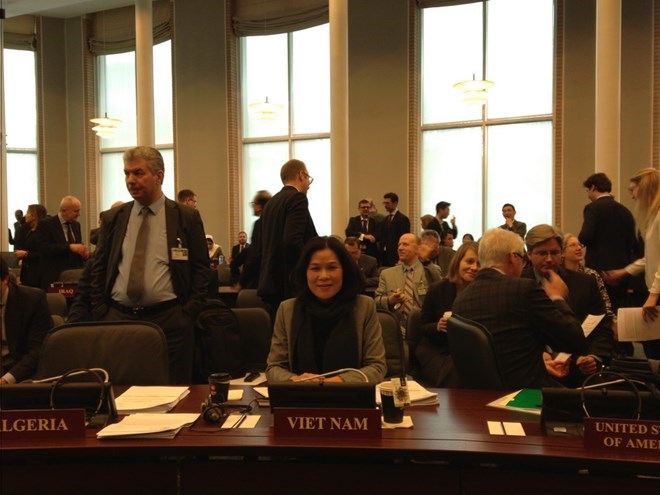
The 20th anniversary of the enforcement of the Chemical Weapons Convention (CWC) will be marked on April 26 in The Hague, an occasion to honour global efforts, including by Vietnam, to eradicate chemical weapons.
 |
| Ambasador Ngo Thi Hoa, Vietnam's permanent representative at the OPCW, at a meeting of the OPCW Executive Council in March 2017. |
The 20th anniversary of the enforcement of the Chemical Weapons Convention (CWC) will be marked on April 26 in The Hague, an occasion to honour global efforts, including by Vietnam, to eradicate chemical weapons.
The event in the Netherlands, which will also celebrate 20 years of the Organisation for the Prohibition of Chemical Weapons (OPCW), will also promote cooperation in promoting the peaceful uses of chemistry while sharing experience to improve the OPCW’s activities.
The CWC was signed by 130 countries in Paris, France, on November 13, 1993 after more than two decades of negotiations. It took effect in 1997, leading to the establishment of the OPCW to ensure the implementation of the convention.
The CWC requires states not to develop, produce, otherwise acquire, stockpile or retain chemical weapons, or transfer, directly or indirectly, chemical weapons to anyone; not to use chemical weapons; not to engage in military preparations for use of chemical weapons; not to assist, encourage, or induce anyone to engage in any activity prohibited to a state under the convention.
Each state is also required to destroy all chemical weapons and chemical weapons production facilities it owns or possesses or that are located in any place under its jurisdiction or control, as well as any chemical weapons it abandoned on the territory of another state no later than 10 years after joining the convention.
The formation of the CWC and the OPCW opened a new chapter in the fight against the proliferation of weapons of mass destruction around the globe. For the first time, the world had a multilateral convention on military disarmament that specifies a deadline for destroying all weapons of mass destruction.
Up to 192 countries which make up 98 percent of the world’s population have become OPCW members, including the five permanent members of the UN Security Council and nations with developed chemical industries.
Ambasador Ngo Thi Hoa, Vietnam's permanent representative at the OPCW, at a meeting of the OPCW Executive Council in March 2017 (Photo: Vietnamese Embassy in the Netherlands)
Under the OPCW’s inspection, nearly 95 percent of the 70,000 tonnes of the world’s declared chemical weapons have been destroyed. Russia and the US expect to finish the work in 2020 and 2030, respectively.
The Nobel Peace Prize 2013 for the OPCW was recognition of the organisation’s efforts and contributions to international peace and security.
Vietnam signed the CWC as soon as the convention was finished in 1993 and ratified it in August 1998. Since then, the country has proved an active member.
Cooperation between Vietnam and the OPCW has been enhanced, especially in communications and technician training. Vietnam has facilitated OPCW experts’ inspection of its chemical industry facilities and issued legal documents regarding the CWC implementation.
During a visit to the Southeast Asian nation in 2006, then OPCW Director General Rogelio Pfirter said Vietnam was one of the countries with the earliest and fullest legal system relevant to the CWC implementation, which reflected the seriousness in realising the commitments made by the Vietnamese Government when it signed the convention.
Since it was elected to the OPCW Executive Council for 2016-2018, Vietnam has coordinated with other member states to promote the destruction of weapons of mass destruction, including chemical weapons, supported the CWC adherence and other activities of the OPCW, condemned the use of chemical weapons, and underlined the need to protect countries’ rights and legitimate interests in developing the chemical industry for peaceful purposes.
(Source: VNA)





